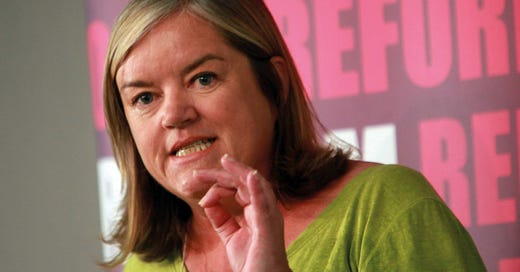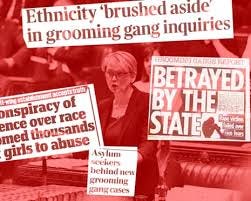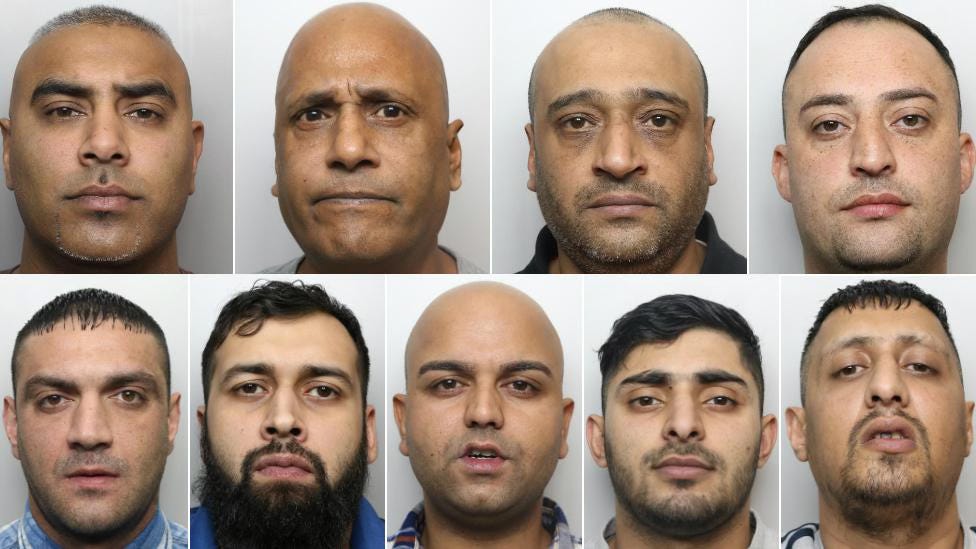This week I had gloomy holiday fun reading all those commentaries on Louise Casey's audit on child sexual exploitation (or grooming) and working out which bits, if any, the commentator had actually bothered reading. The Casey report is nearly 200 pages long - that's a half day's eye-strain at least and people have deadlines. I don't, so I read it all.
My prize for the week's most eccentric take on Casey belonged to the Times columnist who blamed the grooming scandal in part on Margaret Thatcher’s and Tony Blair's "open" trade policies. Open trade means openish borders, openish borders mean strange people from alien cultures entering the country, alien cultures mean sexual abuse of our women by their men. The author - once a keen Thatcherite - admitted to regretting her former allegiance and now adheres to an anti-libertarian, nationalist ideology with the same certainty with which she once (and not so long ago) clung to its opposite.
More - much more - on the ethnicity question later. In the meantime let's note that in these situations people have a tendency to discover that they have been right all along about everything else. A (usually brilliant) commentator on a national magazine used the occasion of Casey's report to launch an attack on Keir Starmer, whose apparent change of heart on the necessity for a national inquiry into grooming was, she strongly asserted, of a piece with his U-turns on other subjects, from trans rights to pensioner fuel allowance.
But she seemed not to have noticed that Starmer's volte face was actually a result of Casey's own change of mind. Casey revealed that she had gone into her review process (as commissioned by the government) sceptical about the need for such an inquiry. But she was "duly unimpressed" (a significant understatement) by the response she received from some local authorities, that she felt their tardiness and lack of transparency warranted the challenge that a national inquiry would provide. Did she "U-Turn"? Of course not.
There's this too: Starmer critics could well fail to notice Casey's mention of how, until 2013, the CPS guidelines in emphasising the reliability and consistency of witnesses, led to many cases involving grooming victims being dropped. This emphasis was changed allowing, in Casey’s words, "more cases to be prosecuted effectively". The DPP was Keir Starmer.
What's actually in the report?
If you were to judge the Casey review by the headlines and editorials you'd be forgiven for thinking that the ethnicity of the abusers is almost the only question raised by Casey. This has fed into a narrative common on social media, talk shows and right-wing newspapers, given fullest articulation by the leaders of Reform UK and echoed by the Conservative front bench. Broadly it is that - motivated by political correctness-induced denial or else by fear of (Muslim) communal pressure - various authorities refused to recognise or act upon the known fact of Pakistani men preying on white girls. And so the grooming grew. This, of course, will be what they're expecting from the national inquiry when it reports in three years’ time. But as we will see it probably isn't quite what they'll get.
So what does Casey actually say? Her review seeks to answer three questions: who are the abusers and what characterises their abuse, who are the victims and what accounts for their vulnerability and what has been the response of authorities and agencies to the abuse in terms of safeguarding, monitoring, investigating and prosecuting. There was also a fourth subterranean thread, possibly the most uncomfortable of all, which may be why no-one wanted to address it.
The abusers: who?
Here is Casey's summary of their characteristics:
Offender networks are often loosely interconnected and based around existing social connections. This means they are often broadly homogenous in age, ethnic background and socioeconomic status. Acting within a group is likely to have a disinhibiting effect on the perpetrators.
A 2020 Home Office paper noted that in several cases they examined, offenders and victims came from different communities, and officers suggested that disregard for victims from outside the perpetrators’ own community may be an enabling factor for offenders.
It also noted that empathy with victims is a likely barrier to offending behaviour, and therefore disregard for victims - whether through misogyny or so-called 'othering' - enables offenders to overcome this barrier. Operation Stovewood [NOTE: Stovewood is a National Crime Agency-led investigation into allegations of abuse in Rotherham between 1997 and 2013. The latest convictions resulting from Stovewood - two white men who were in their late teens when the offences were committed - led to sentences last month] consider this to have been a factor at play in Rotherham, where nearly two-thirds of offenders were from a Pakistani ethnic background, and the majority of the girls were White.







